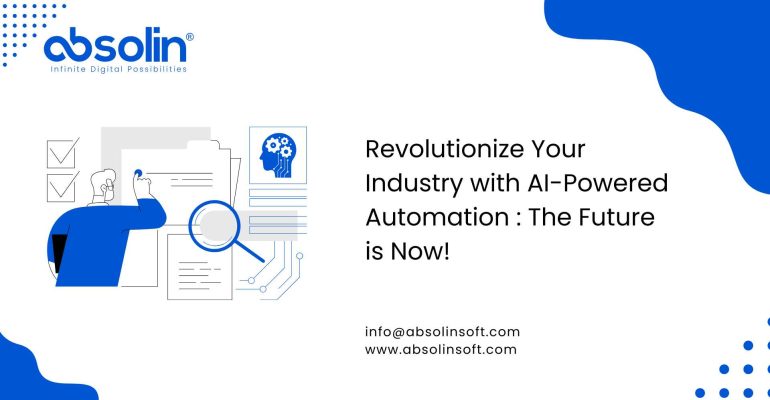How AI-Powered Automation is Transforming Industries Worldwide
AI-powered automation is rapidly reshaping industries across the globe, driving efficiency, productivity, and innovation in ways that were once unimaginable. From manufacturing to healthcare, AI automation is making processes faster, more accurate, and less reliant on manual intervention. Here’s how this technological revolution is transforming key sectors:
1. Manufacturing
AI automation has revolutionized the manufacturing industry, particularly through the use of robotics and smart factories. AI-driven machines can perform tasks with high precision and speed, reducing the margin for human error and significantly boosting production output.
Impact:
- Predictive Maintenance: AI systems analyze equipment data to predict when machines will fail, reducing downtime and maintenance costs.
- Smart Robotics: Autonomous robots can work alongside human operators, improving efficiency in assembly lines.
2. Healthcare
In healthcare, AI-powered automation is transforming everything from diagnosis to patient care management. AI systems help in diagnosing diseases by analyzing medical images and patient data, enabling earlier detection and more accurate treatments.
Impact:
- AI Diagnostics: AI algorithms can analyze scans, such as X-rays and MRIs, to identify abnormalities that may be missed by human eyes.
- Robotic Surgery: AI-powered robotic systems assist surgeons in performing precise, minimally invasive procedures, reducing recovery times for patients.
3. Finance
AI automation is making finance more efficient, secure, and customer-friendly. From fraud detection to automated trading systems, AI is enabling financial institutions to process and analyze vast amounts of data rapidly and accurately.
Impact:
- Fraud Detection: AI-powered systems can detect unusual transaction patterns and flag potential fraud cases in real-time.
- Automated Trading: AI algorithms execute trades at lightning speed, optimizing for market conditions and maximizing profit margins.
4. Retail and E-commerce
Retailers and e-commerce businesses are using AI to enhance the shopping experience and streamline operations. AI algorithms help in personalizing customer experiences by analyzing shopping behaviour and providing tailored recommendations.
Impact:
- Personalization: AI systems can recommend products based on previous purchases and browsing habits, enhancing customer satisfaction.
- Inventory Management: Automated systems monitor stock levels, forecast demand, and reorder products without human intervention, reducing shortages and overstock situations.
5. Logistics and Supply Chain
AI-powered automation is optimizing the logistics and supply chain industries by improving route planning, inventory management, and demand forecasting. This has led to reduced costs and faster delivery times.
Impact:
- AI-Driven Fleet Management: AI algorithms optimize delivery routes, reducing fuel consumption and improving delivery times.
- Supply Chain Optimization: AI helps in forecasting demand, optimizing inventory, and predicting potential disruptions in the supply chain.
6. Customer Service
AI chatbots and virtual assistants are transforming the way businesses handle customer service. These AI systems can handle a wide range of customer inquiries, reducing wait times and providing quick, accurate responses.
Impact:
- 24/7 Support: AI chatbots can provide instant responses to customer queries at any time, improving the overall customer experience.
- Cost Efficiency: By automating common customer service tasks, businesses can reduce the need for large support teams, saving on operational costs.
7. Agriculture
AI-powered automation is also making waves in agriculture, optimizing farming techniques, and increasing crop yields. From AI-driven tractors to smart irrigation systems, farmers are adopting new technologies to improve efficiency.
Impact:
- Precision Agriculture: AI helps farmers monitor crop health, optimize irrigation, and apply fertilizers with precision, reducing waste and boosting yields.
- Automated Harvesting: AI-powered robots can harvest crops with speed and accuracy, reducing reliance on manual labor.
8. Energy
AI is transforming the energy sector by optimizing energy production and distribution. AI systems can predict energy consumption patterns and optimize the performance of renewable energy sources like wind and solar.
Impact:
- Smart Grids: AI helps in managing energy distribution across smart grids, ensuring that energy is used efficiently and that supply meets demand.
- Predictive Energy Maintenance: AI systems predict failures in power plants or wind turbines, allowing for timely repairs and reducing downtime.
Conclusion
AI-powered automation is transforming industries across the board, offering businesses new ways to optimize their operations, reduce costs, and improve customer experiences. As AI technologies continue to evolve, we can expect even more innovative applications that will further reshape industries and redefine the future of work.






